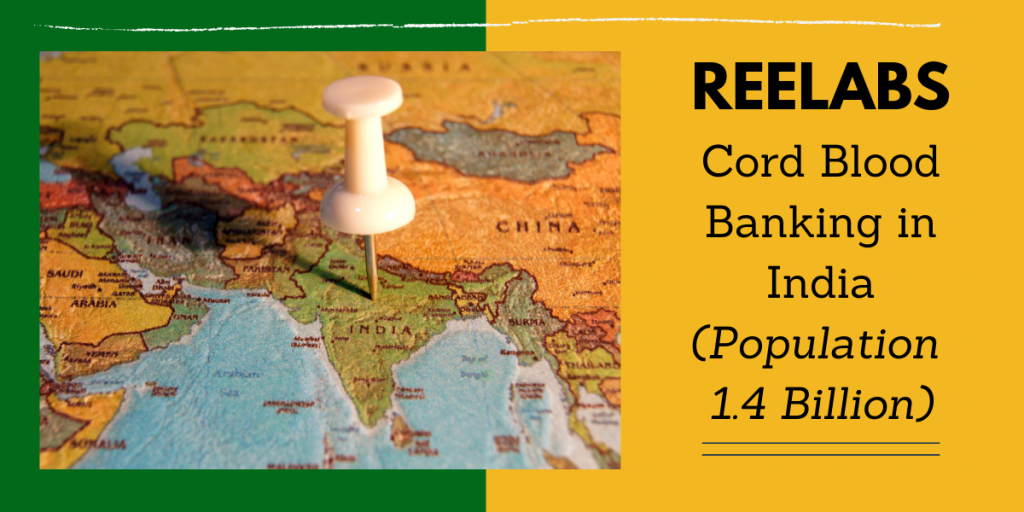ReeLabs is an important cord blood banking brand within India. Cord blood banking in this region is of historic importance, because India has an astounding population of 1.4 billion. Representing 18% of the global population, nearly one-in-five people lives in India, placing it head-to-head with China as the world’s most populous country. India’s population growth is fueled by a birth rate (19 births/1,000 population) that substantially exceeds its death rate (7.3 deaths/1,000 population).
If you’re involved with cord blood banking, then you need to pay attention to this enormous consumer market.
In this interview with Dr. Abhijit Bopardikar, Director of ReeLabs, he explains the rise of cord blood banking within India and discusses the importance of pairing stem cell therapy and research applications with stem cell storage services.
In this article:
Cade Hildreth: How and when was ReeLabs founded?
Dr. Abhijit Bopardikar: There are numerous companies offering stem cell banking and a handful involved in research, trials or the development of therapies using these stem cells. However, none in India and very few in the world offer all those services under one roof.
It is imperative that companies involved in stem cell banking are involved with its applications the exercise of banking these cells becomes futile and a disservice to the clients who spend to acquire this biological insurance.
Started in 2009, that is the void that ReeLabs wanted to fill.
The purpose of starting ReeLabs was to have a world class, sophisticated enterprise that could effectively deal with stem cell banking (from all available human sources), therapy using these cells, and meaningful research and clinical trials using these cell types.
Cade Hildreth: What is your background and how did you get involved with the company?
Dr. Abhijit Bopardikar: I am a qualified MD Pathologist and have been instrumental in setting up a chain of Blood Banks and Pathology Diagnostic Centers in the city of Mumbai. As time passed, I got interested in the field of stem cell medicine, took extensive training both in India and overseas to fortify my knowledge base, and started ReeLabs as its Founder and Director.
Cade Hildreth: What types of stem cell services does ReeLabs offer?
Dr. Abhijit Bopardikar: ReeLabs offer banking of stem cells derived from over 10 human sources, including:
-
-
- Umbilical cord blood
- Umbilical cord tissue
- Placenta
- Amniotic sac
- Amniotic fluid
- Menstrual blood
- Dental pulp
- Bone marrow
- Adipose tissue
- Hair follicle
-
It is the only company with an extensive pedigree and expertise of banking stem cells from placenta, considered by most researchers as the finest source of stem cells both in terms of quality and quantity.
Additionally, ReeLabs also offers stem cell treatment for various chronic, degenerative diseases, including Autism, Cerebral Palsy, Chronic Kidney Diseases, Chronic Liver Diseases, Cardiovascular diseases, Diabetes Type 1 and 2, ALS, Multiple Sclerosis, Spinal cord injury, stroke, Muscular Dystrophy, Parkinson’s disease, Alzheimer’s disease, Macular Degeneration, Retinitis Pigmentosa, Osteoarthritis, Pulmonary Fibrosis, Interstitial Lung Disease, Hair-loss and Anti-aging etc.
We have also filed two international patents dealing with applications of stem cells in the field of clinical medicine and have launched clinical trials using allogenic stem cells from placenta, cord blood, cord tissue and foetal (abortus) material (our proprietary technology).
Cade Hildreth: What are dental pulp stem cells and why should they be stored?
Dr. Abhijit Bopardikar: Dental pulp is the soft tissue inside a tooth. It is the central part of a tooth and is made up of a living tissue which contains powerful mesenchymal stem cells (MSCs). These have the unique ability to differentiate into many types of cells including bone, heart muscle, skeletal muscle, cartilage, adipose (fat) and nerve cells, and thus have immense potential to treat various degenerative disorders.
Dental stem cells embryologically originate from the cranial neural crest and hence their potential application especially in the neurodegenerative segment is particularly exciting.
These cells can be harvested with ease from a healthy tooth that has fallen out or has been extracted. Thus, they offer multiple chances of collection.
Cade Hildreth: Are you offering stem cell treatments involving dental-pulp stem cells, and, if not, do you plan to in the future?
Dr. Abhijit Bopardikar: Yes, we are offering treatments using dental pulp stem cells.
Cade Hildreth: What is the current state of stem cell storage in India? How common is it and how many companies are involved?
Dr. Abhijit Bopardikar: Lately, there is considerable awareness regarding stem cell storage and coupled with the large number of infant deliveries in a country like India. This has led to the emergence of many companies offering this service. However, most Indian companies only involved in umbilical cord blood banking. There are a dozen companies currently involved with this.
At present, ReeLabs, a Mumbai based company, is the only one which offers both stem cell banking and stem cell based treatment.
Cade Hildreth: How many cord blood stem cell samples have you stored to date?
Dr. Abhijit Bopardikar: We have stored over 20,000 samples from various human sources.
Cade Hildreth: What are your five-year goals for ReeLabs?
Dr. Abhijit Bopardika: ReeLabs is poised to be one of the biggest player in stem cell industry with a world class technology and infrastructure of stem cell banking and therapy from all available stem cell sources.
On the research front, we would like to complete clinical trials using stem cells from allogenic sources (our proprietary technology) and launch it as a product for the masses in an endeavor to mitigate many chronic, degenerative, and life threatening disorders.
Cade Hildreth: Is ReeLabs seeking in partnerships, collaborations, or investments?
Dr. Abhijit Bopardikar: Yes, we welcome like-minded people and companies to collaborate with us for all of the above.
Cade Hildreth: How can people get in touch to learn more information about ReeLabs?
Dr. Abhijit Bopardikar: You can reach us at ree@reelabs.com or via our website www.reelabs.com.
